American Political Violence Rare
While our politics are seldom violent, our violence is often politicized.
Responding to over-the-top statements by Ian Bremmer and other normally thoughtful observers about America’s out-of-control politics, Dan Drezner rounds up the evidence showing “The rarity of American political violence.”
I commend the piece to you in its entirety but want to draw especial attention to two pieces Dan mentions.
James Pethokoukis asks, “Is America growing politically unstable?” He answers, in part:
[P]olitical violence has been rare in the United States in recent years. That’s despite the disputed 2000 presidential election, the unpopular Iraq war and the election of the first black president. Indeed, the World Bank ranks America above the UK when it comes to “political stability and absence of violence.” And the U.S. rank has actually been on the rise in recent years.
That ranking partly reflects the fact that even heated talk doesn’t cause instability. But if the freedom to indulge in such rhetoric and to protest is curtailed, it can be a different story — one reason, perhaps, why China receives low marks from the World Bank. So it’s disturbing that some in Congress are already working on new laws to limit political speech, in addition to ongoing attacks on talk radio. Those efforts, if they move toward limiting legitimate expression, should worry global investors far more than a one-off lunatic act, however shocking its results.
Adam Serwer adds:
Political violence in the United States has never been more illegitimate. There was a time when a member of Congress could walk into the Senate and beat a political rival senseless and walk away unmolested. The South was once a place of unrestrained terrorist violence conducted with the tacit approval of local authorities. Even when those authorities were brave or responsible enough to press charges, securing guilty verdicts would be difficult because of a local culture willing to accept crimes committed in service to white supremacy. We live in a time where no major political movement would be willing to openly justify such behavior.
This is why, in the aftermath of the incident, both the left and right began placing the blame on the other side. While liberals pointed to the tone or right-wing discourse, conservatives sought to “depoliticize” the incident by pointing to evidence of Loughner’s mental illness.
Then again, he continues, while our politics are seldom violent, our violence is often politicized:
If the shooter had been a member of a Mexican drug cartel as some conservativesassumed, they would be calling for stricter immigration laws and blaming the White House for lax enforcement. If the shooter had been named “Mohammed,” no amount of evidence of mental illness would have persuaded conservatives that Islam wasn’t the culprit and that the administration’s terrorism policies had failed. Instead, the shooter appears to have lurked on the extremist fringe of right-wing politics, much like Byron Williams and James von Brunn, and so conservatives are calling for a calm and reasoned assessment of the facts. The guilt is individual, rather than collective.
They’re right; we should be careful not to let the heat of the moment push us into making rash decisions about how to respond to these kinds of incidents. It just isn’t what they would have said had the circumstances been different.
And vice versa, of course. Democrats immediately seized on the issue to score political points against the Right. It’s a perfectly natural tendency, if one I’d love to see restrained.
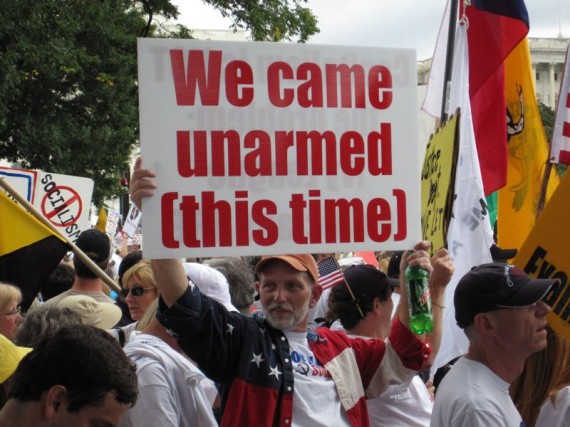


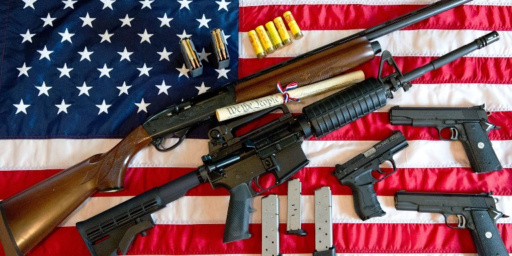
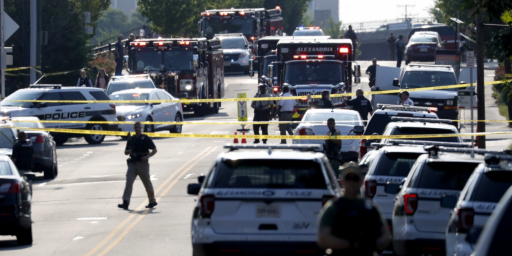
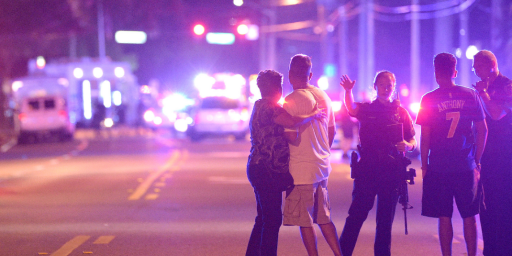
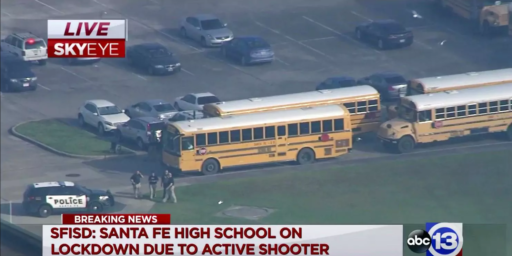
You know, your graphic really destroys your piece. If you want to “score political defense” you should really take it down, and hide it somewhere.
The sign reads: “we came unarmed (this time)”
Defensible political speech, eh?
Let me make this clear. As I’ve said before, there are those who take their political attacks too far. Some go way too far.
Just the same, we are seeing some who take their defense too far, and perversely want to use a violent incident to shield violent rhetoric.
That is deeply wrong.
@john:
I continually decry the rhetoric depicted by the sign used to illustrate the post. I chose the picture for two reasons:
First, it illustrates the political climate that have Bremmer and others worked up.
Second, despite the idiocy of the sign — and similar sloganeering at some of the Tea Party rallies — it’s actually just speech without action. Indeed, the people who actually go out and commit political violence seldom hold up signs to warn us in advance. The guy with the sign is, almost surely, just some frustrated middle aged man talking tough via a sign who’s of no danger to anyone.
Indeed, I think Pethokoukis may have a point when he implies that letting people get their frustration with the political system out in this way may be why we have so little political violence. There’s actually much more of it, perhaps counter-intuitively, even in the sane, gun-free societies of Western Europe, much less repressed China. See all the rioting in Greece, France, England, and elsewhere over relatively minor changes in social programs.
“it’s actually just speech without action”
You hope. Google search for the Financial Times article “Paranoia disfigures the Tea Party” for the offshore view of how this fits. I would call it moderate.
“It’s a perfectly natural tendency, if one I’d love to see restrained.”
Whether it’s a natural tendency or not, I would love to see the violent rhetoric on the right restrained.
Actually more than hope, right? You are making the argument that the paranoia the FT article describes is somehow health for America. “letting people get their frustration”
Where’s Patricia, the pyschologist. I’d love to get her response to that. Well, we know what she said here before:
That is a dangerious rationalization on your part, James.
Sure, 100 years ago there was more political violence than today. But I am interested in if there was more political violence 5 years ago verses today. It would be an interesting way to find out if the political rhetoric of the tea partiers and Sara Palin and Michelle Bauchman and Glenn Beck have influenced any kind of upsurge.
> I continually decry the rhetoric depicted by the sign used to illustrate the post
To your credit, you have. What you have not done is come to grips with the fact that that is pretty close to a mainstream sentiment in your party.
> it’s actually just speech without action
And what do you call it when people show up armed outside a location where the President is speaking?
“American political violence rare?” Compared to what? Our Anglophone cousins? Other industrial countries? Other countries in which gun ownership is widespread, like Switzerland? The motivation for this article seems to be a strong desire by otherwise sensible people like Joyner to justify their bizarre attitude to gun ownership. Should mentally unstable people really have access to semi-automatic weapons? According to Joyner, yes. It boggles the mind.
Stan, don’t you know? Guns are just like cars or baseball bats or kitchen knives. Get with it man!
As violent as liberal political protests almost always are, im happy that they don’t like guns.
But the rocks sticks, fences, flaming cocktails, burning cars and buildings can still leave a mark.
@Stan:
Compared to the UK at least, yes. I can’t find the rankings from a quick scan of the link provided by Pethokoukis to the World Bank study.
Uh, no. I addressed that in a post (“Gun Rights and Crazy People“) yesterday.
Last night I heard it reported that six Congressmen had been killed/murdered in U.S. history. I thought that was pretty low since I could immediately name two, Huey Long and Bobby Kennedy. Surely, there would be more. I also wonder whether Congressmen are statistically safer than the population at large, though perhaps the set of Congressmen is too small to make a meaningful comparison.
I would expect Presidents and Judges to be more vulnerable because of their different roles.
My main take away though is that I think “the People” should resist the desire for the legislature to protect themselves from the People.
My second amendment rights are the only thing standing between government and your first amendment rights. Some of you on the left would remove all of these. Try it!
There is absolutely no evidence the shooting in Tucson was political in nature. It is just like the left to try to advance there cause on the back of murdered 9 year old girls.
“What you have not done is come to grips with the fact that that is pretty close to a mainstream sentiment in your party.”
Some people just like to publicly humiliate themselves with inane drivel I guess.
Define “Rare”….
Where do they get the idea?
Doesn’t seem very rare to me James.
True Drew. And it’s amazing that you could respond to my quotes before I even posted them!
“Compared to the UK at least, yes. I can’t find the rankings from a quick scan of the link provided by Pethokoukis to the World Bank study.”
“Political Stability and Absence of Violence/Terrorism (PV) – capturing perceptions of the likelihood that the government will be destabilized or overthrown by unconstitutional or violent means, including politically‐motivated violence and terrorism.”
Countries are given a score out of 100.
US scores:
1996 – 78, 1998 – 78, 2000 – 87, 2002 – 57, 2003 – 55, 2004 – 51, 2005 – 49, 2006 – 60, 2007 – 56, 2008 – 65, 2009 – 59
In 2009, the US tied with Kuwait as 87th out of 213 ranked countries.
The UK got a score of 55 in 2009 (2008 and 2009 are the first times they’ve scored below the US since 2000.
For some other countries, in 2009, Norway scored 92, Switzerland 92, Austria 89, Canada 85, Japan 83, Germany 77 and France 66, Sierra Leone 32, Russia 22, Israel 9, and Pakistan 0.
Now, i don’t know how the score is actually calculated, but from actually reading the scores, it does seem like James Pethokoukis cherry picked the UK to make the US position look better.
Furthermore, I don’t think the ranking is useful in the context it is used here, the ranking does not reflect “the fact that even heated talk doesn’t cause instability”. The US score did go down in 2009, and while you could try to make the point that that’s because of the violent rhetoric, it’s not really in the data. But you couldn’t make the counter argument either. The low scores of the US and the UK seems to be due to threats of terrorism, and I think those threats overshadow any change due to violent rhetoric.
In the study I found for 2008, The US was 68th out of 210, and appeared to be less potential for violence than Greece, Italy, and France(69th) and quite a few other countries that you might expect to be more violent in a political nature. (At least those were the European ones that came to mind for me) Interesting numbers.
http://www.nationsencyclopedia.com/WorldStats/WGI-violence-terrorism-governance-score.html
Greece has problems with terrorists (left-wing Marxists mostly), so it’s not a surprise that they get a low ranking (same with Spain and their ETA problem, but I guess their ranking will now improve with ETA giving up). I’m guessing the mafia in Italy helps to lower Italy’s score. But most European countries get higher scores than the US, and a lot get a lot higher scores.
@Davebo –
You found 10 incidents over the course of a year in a country of 300 million people, most of which were influenced by white supremacist rhetoric (I’m just going to go out on a limb here and say that the rhetoric of the Tea Parties/Sarah Palin/others that you want to blame is no more heated than that found in white supremacist tracts), and you call that “evidence” to support your assertion? Seeing as how Broden spoke after all of your listed incidents occurred, how would you say that it caused them?
Furthermore, what, exactly, couldn’t you similarly “prove” by finding 10 incidents in this large country per year? And what would you consider “rare”? Two reported incidents or less? If there were only 9 incidents from July 2009 to July 2010, what conclusions would you draw from that 10 percent decrease?
> Some people just like to publicly humiliate themselves with inane drivel I guess.
While you are at it, why don’t you tell me I am pathetic. Then you will have drained your somewhat shallow well of ideas about political discourse, and the rest of us can move on.
See, When Congress Was Armed And Dangerous for some of our wild and woolly history.
That sign is no worse than the frequent kill Bush signs up just a few years ago – and remember how outraged the republicans were about those signs? Does everyone really have such short memories? Both sides take turns doing this.